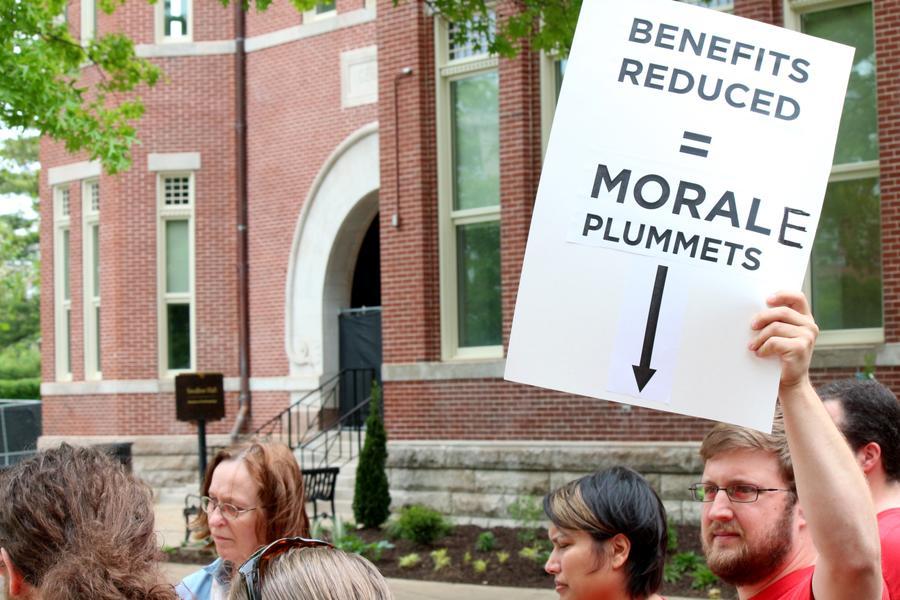Walking from Jesse Hall to Speakers Circle on Monday, 18 faculty, staff and graduate students voiced their discontent over recent changes made to UM System employee retiree health insurance benefits.
“Not OK in August. Not OK now,” one graduate student’s sign read, alluding to when the UM System cut graduate students’ health insurance in August and notified them 13 hours before it expired. MU has since restored graduate students’ insurance, but the event spurred graduate student activism throughout the fall and spring semesters. On Monday, the Forum on Graduate Rights and Coalition of Graduate Workers protested alongside faculty and staff to show their support.
The Board of Curators voted during its April meeting to approve the retiree health insurance changes. Under [the new plan](https://uminfopoint.umsystem.edu/sites/hr/Benefits/GEN/CURRENT/RetireeRec-TRAC-ExecSumm.pdf), employees must fulfill three criteria to qualify for a subsidy: “be eligible for benefits with at least five years of service before Jan. 1, 2018, be at least 60 on his or her retirement date and have at least 20 years of service to the UM System on his or her retirement date.”
If employees meet the criteria, their level of coverage would depend on service and age; those with a combined 80 years or more in service and age would receive the same level of coverage as current retirees. If their service and age totalled less than 80 years, then employees’ subsidies will become a fixed annual payment of $100 per year of service, up to a maximum of $2,500.
Before these changes, the UM System paid up to 73 percent of the monthly premium and provided subsidies at a percentage rate calculated for each employee based on age and years of service.
Rabia Gregory, an associate professor of religious studies, spoke during the protest and said that while the university has a “financial crisis,” faculty, staff and students should not “bear the brunt” of the cuts.
“Morale is at an all-time low,” Gregory said.
She said that the changes to retiree health insurance was just one of many missteps the university had made over the course of multiple years. She also listed [Melissa Click’s firing](https://www.themaneater.com/stories/2016/2/25/melissa-click-fired-board-curators/) and [the decision to close University Press](https://www.themaneater.com/stories/2012/6/26/embattled-um-press-proponents-protest-board-curato/) before deciding to keep it open as additional “violations” the administration had made.
Beginning in front of Jesse Hall, the protesters walked through Jesse Hall, holding up their signs in front of the chancellor and provost’s offices, before walking to Speakers Circle. There, graduate student Will Allbritain sang and played his guitar, and Gregory spoke again.
“We are here today for the people who cannot be here,” Gregory said. “This does not end here, this does not end this week.”
Some graduate students also spoke and voiced their support of the faculty.
“For an institution of hiring learning, Mizzou hasn’t learned its lesson very well,” one graduate student shouted out.
Gregory thanked the graduate students for this support.
“It’s important to stand with everyone on campus who keeps getting wronged by the Board of Curators and administration,” Gregory said.
Graduate student and CGW Co-Chairman Eric Scott echoed the sentiment.
“All of us need to stand together,” Scott said. “Injustice to one of us is injustice to all of us.”
Throughout the protest, two MU police officers stood at a distance, following as the protesters made their way through Jesse Hall to Speakers Circle. In April, MU officials announced that the existing policy banning disruptive protests would be enforced.
The presence of the police during protests has changed the way they protest, Gregory said. They have to be quiet in some locations and can only gather in certain places.
Gregory watched the two officers as they stood across the street from the protestors.
“And they lost their retiree health insurance, too,” she said.
_Edited by George Roberson | [email protected]_














